- Home
- Michael McBride
Snowblind II: The Killing Grounds Page 4
Snowblind II: The Killing Grounds Read online
Page 4
He was used to it, though. The detectives had made no secret of their dislike for him and what they thought of his alibi. While he’d never accepted their open hostility toward him, he’d known that his only option was to tolerate it if he ever hoped to see Michelle again. They were only playing the odds, after all. Avery wasn’t so blind to the situation that he couldn’t see how he looked on paper. They hadn’t found a single lead. Not one. And the percentages showed that the significant other was responsible more often than not. In the absence of evidence, they had no one to look at except for him, despite the fact that he’d been at work, as witnessed by eight other employees and countless patrons, all of whom were interviewed multiple times by the investigating officers.
He’d never been this close, though, so he could deal with the sideways glances, the overt suspicion, and the way the sheriff kept his hand in his jacket pocket, right by his holster, if this was his chance to finally learn what happened to Michelle.
Time lost all meaning in the forest and his sense of direction was replaced by a progressive reliance upon the game trail that guided them ever higher. He had no idea how long they’d been walking when they ascended above the treetops and to the base of a towering granite escarpment. Until that moment, Avery had genuinely believed that he’d searched nearly every square inch of the Rocky Mountains. From the top of the butte, he stared down upon thousands of acres of wilderness he’d never seen before, let alone explored, and realized just how wrong he’d been.
“Down there,” the ranger said, and pointed straight down over the edge.
Avery leaned over the precipice and saw a steep hillside covered with snow. The wind kicked up with a howl. He stepped back from the edge and wrapped his arms around his chest. The clouds to the north had grown even darker and rose higher into the sky even as they expanded outward.
“What’s down there?” Dayton asked.
“The ram. It was right there.”
The ranger looked from one of them to the next as though seeking confirmation, and then headed for the bottom without another word. The dog bounded past him and appeared far below before his trainer even commenced her descent. The sheriff and the skinny guy picked their way down much more slowly. Avery glanced down at the bare earth one last time before hurrying to catch up with them.
“I’m telling you. It was right here.” The ranger took off his backpack and rummaged around inside until he found a digital camera. He raised it in triumph, then scrolled through the images on the tiny screen. “See? Look.”
The picture was of a dead bighorn sheep, lying on ground that looked a whole lot like that beneath their feet.
“How much does an animal like that weigh?” Dayton said.
“I know what you’re thinking, but I swear to God, it was right here this morning.”
“What’re we talking? Three hundred? Three-fifty?”
“Somewhere in there.”
The sheriff turned and inspected the snow leading downhill. There were obvious tracks and pinkish blotches of discoloration, although it was hard to tell what had left them or how long ago.
“A lot of these hills tend to look alike…”
“You think I don’t know where I was? This is the spot. I’ll prove it.”
The ranger dropped to his knees and brushed aside a crust of windswept ice. The flattened grasses were brittle and made a crackling sound when he parted them.
“What do you figure is capable of hauling off a three hundred-pound animal without leaving tracks all over the place?”
The dog ran circles around the ranger, stopping every few feet to sniff at the ground or the air before racing around again. It darted left, then right, then back left again, its nose to the ground.
“See? There!”
The ranger leaned back and gestured at rocks and soil blackened by blood.
The dog sniffed the ground and froze, its tail straight and still. It abruptly looked downhill toward the trees. It lowered its head and the fur rose along its haunches. It bared its teeth and growled from deep inside its chest.
“What do you smell, boy?” its handler said. “That’s his ‘alert’ posture. It’s his cue that he has a scent.”
“I’m sure he does. There’s blood all over—”
“No. Not just any scent. An unfamiliar scent. I trained him in this forest. He knows the scent of those bighorns. We have to teach our dogs to find any unfamiliar scent because so many times we’re dispatched without anything to go on. No clothes or personal effects whatsoever. So he has to be able to isolate anything out of the ordinary and alert me to it.”
“So what did he find?”
“We’ll know soon enough, but not if we don’t get moving. People shed their dead skin at a rate of forty thousand cells per minute. These dead cells form what we call a ‘skin raft,’ which floats on the air before settling to the ground, but they don’t last long, even under ideal conditions, let alone in this wind. What he’s telling us is that someone was here recently, presumably whoever took your carcass. I trained him to give an ‘alert bark’ for human scents, too, but apparently he—”
The dog shot off down the hill, charging through the snow. Its handler took off after it, leaving the four of them to watch the orange-clad shapes slipping and sliding down the hill.
The ranger stood and brushed the dirt and congealed blood from his hands onto his pants.
“Damn poachers,” he said, and started down through the snow after them.
Avery watched the dog bound into the dark forest and suppressed a shiver. The body of the woman he loved was potentially somewhere down there and every step brought him closer to the moment when hope was stolen from him. When it was gone, what would be left of him?
The snow began to fall as the leading edge of the storm eclipsed the sun, which was already well into its descent.
Avery tugged up his collar, ducked his head against the storm, and followed the trail of the dead animal’s blood through the accumulation.
* * *
Dayton had hoped to be back in his truck before sundown, or at least shortly thereafter, but he realized that was a pipedream. The best he could hope for now was to find where the ranger had discovered the video camera with enough light left to cordon off the scene before the snow started falling in earnest. He figured the girl’s remains—if they were out here—couldn’t be far from where she’d hidden the camera, which was the final act of a desperate woman who knew her end was at hand. And while Zeke was no cadaver dog, he’d been trained to sniff out skiers buried under avalanches; surely a body in a shallow grave would at least catch his attention.
He’d been cautious with what he shared with Crowell. She was his deputy—and an excellent one at that—but more and more since she’d started training that dog he’d felt her allegiances shifting toward her other career and he had no doubt that he’d lose her soon enough. She’d already trained as an EMT and had privately talked to him about taking an extended leave of absence to go to paramedic school at some point, which meant her heart just wasn’t in law enforcement anymore. He understood how these things worked; there were days when the last thing he wanted was to crawl out of his warm bed and pin on that star. The difference was whatever misgivings he had were his own. Once you opened your mouth and started sharing them, you already had one foot out the door and were simply looking for someone to give you a shove.
She was better off thinking there was still hope of finding the girl alive, without which it was really no longer a search and rescue issue and he’d have to wait days to get the cadaver dogs out here from Grand Junction and by then the entire area would be under several feet of snow. Besides, maybe there still was a chance that the girl and her friends were still alive. And maybe if he told himself as much enough times he’d eventually believe it.
Thom was the only one who shared the full extent of Dayton’s knowledge, and only because the sheriff’s technological skills were in dire need of an upgrade. The station had been renovated and wrench
ed into the twenty-first century in the wake of the ordeal with the hunter in the diner. You didn’t just walk out of the storm with a severed head under your jacket without making the national news, and you certainly didn’t shoot that man dead without finding yourself under the microscope. The news had portrayed him as the bumbling Barney Fife-type and the town as a kind of Mayberry-in-the-mountains. The state’s first response was to issue him a blank check to modernize the department, which he promptly handed right back and told them to do whatever they needed to do, largely because he didn’t have the slightest clue where to start. And, privately, he was dealing with his own demons.
It took considerable time to recover from shooting William Coburn, and while he was going stir crazy inside his own head, the last place he wanted to be was training in the station with everyone else. He might have only been in his late forties, but he was every bit the relic his predecessors had been. Up here in the mountains you were essentially cut off from the rest of the world. The job of being sheriff wasn’t as much about the act of policing as it was about maintaining relationships, both his own and those between everyone else. Crime didn’t happen up here without a half-dozen people knowing who did it. That’s what turned his entire world upside down about that night in the diner. Things of that nature weren’t supposed to happen here. And while the violence of the crime had been shocking, it was what he’d seen in the aftermath that disturbed him even worse.
The victim’s head…there’d been obvious teeth marks in the flesh. He didn’t need some forensic odontologist to tell him that. He’d seen the markings with his own eyes. On the neck. On the cheeks. Something had taken bites from that man and he didn’t buy the logic the dentist they’d brought in from Denver had said about the elasticity of the superficial tissues and the process of repeated freezing and thawing of the tissue distorting the shape and size of the dentition. There was no way in hell they could have been made by the man he shot, but it was far easier to believe that version of the story than the one in which he murdered an innocent man because he’d been scared. Or maybe he just chose to believe it.
Whatever the reason, this had the potential to be another high-profile case and he needed everything to be properly documented. He certainly lacked the skills to do so. Besides, Thom had been eager to do it and considering he wasn’t on the payroll, it would spare the county the overtime for one of his deputies and force him to recall another to man the station while they were out here in this godforsaken forest for Lord only knew how long. Whether Thom was here out of boredom or some twisted fascination would be easier to justify to the county commissioner—or, God forbid, the state and feds—than why he essentially abandoned his county to search for a missing group of kids whose bodies would surely keep until the spring thaw, if the scavengers had left anything behind.
The image of the teeth marks on the dead man’s cheek rose to the forefront of his mind. He shook his head to clear his thoughts as he ducked under the lower canopy of the lodgepole pines. It had to be a good fifteen degrees colder in the perpetual shade, although he was at least spared from the gusting wind, which bowed the upper reaches with enough force to elicit cracking sounds from the trunks. Snow had already begun to filter through the branches and collect on the ground.
Crowell stood out like a beacon in her orange jacket, while that dog of hers only occasionally flashed his colors through the dense underbrush. The ranger followed right behind her clear up to the edge of the steep gully. They stood motionless at the edge while Dayton crunched toward them on the carpet of dead pine needles. He was about to step past them when he saw what held them enrapt.
Zeke was maybe fifteen feet down the cut on top of a rock formation from which a single crooked pine grew. His entire back bristled and he pointed toward the opposite slope with one front leg.
Dayton looked in that direction and saw tatters of a bloody pelt hanging from the branches and decorating the far bank, from which a trail of blood led down to a heap of flesh and bones.
A flash of light from his right caused Dayton to flinch. He whirled to see Thom taking pictures of the carnage with a fancy digital camera.
“That wasn’t there earlier,” Seaver said.
Dayton looked back at Avery, but couldn’t decipher the expression on his face. His eyes were concealed by the shadows and he’d gone deathly pale. As little as he wanted to, Dayton turned his attention on the task at hand and scrambled down to the bottom of the ravine, where the snow accumulated on the remains. Zeke didn’t so much as look in his direction when he passed.
The first thing he noticed was that the bones definitely weren’t human. It wasn’t until he was much closer that he recognized the hooves and the fringes of fur surrounding their juncture with the broken bones of the animal’s lower legs. There were still knots of tendons at the joints and just enough white fur on the haunches to confirm what he already knew. This was what was left of Seaver’s ram. Or at least part of it. It appeared as though the back half had been torn off.
There was no sign of the front half or the viscera.
* * *
Seaver couldn’t take his eyes off the remains. This wasn’t the work of poachers. This kind of damage could only have been inflicted by an animal, likely several of them for the physical devastation to be this complete. The problem was there were no larger species of predator in this area that hunted as packs. He’d done the majority of the surveys himself and triple-checked what little he’d delegated to other rangers and graduate students.
There were brown bears to the northwest and black bears to the northeast. While the former was large enough and possessed the requisite ferocity, the population had evolved a dependence upon man and lived on the fringes of civilization. The black bears were considerably smaller and more timid. While they could probably bring down a wounded animal, they would have had no interest whatsoever in a dead one. The same logic applied to the mountain lions that roamed into the national forest from the south during the summer months, but he hadn’t seen so much as a single paw print since the middle of July, which, now that he truly thought about it, was an anomaly in their traditional behavior patterns. And none of those species hunted in packs. So what did that leave? Wolves? The nearest established population was hundreds of miles to the north in Yellowstone.
He watched the ground as he crept down the hill. He’d spent enough time in these mountains that he could identify the tracks of nearly every species of mammal and bird. In fact, cataloguing prints had been one of his main projects during the countless hours spent scouting this region. Other than the sheriff’s tracks, however, there wasn’t a single identifiable print. The detritus was undisturbed clear down to the bottom, where he found the impressions of his own tread from that morning nearly concealed by the snow. The ram’s trail was less apparent than it had been earlier and would only last so much longer, but still it stood out to him as though lined with running lights.
The sheriff nudged the carcass with the toe of his boot and looked back at him.
“What do you think? Bears?”
Seaver shrugged. If there were a better answer, he certainly didn’t know it.
He crouched over the remains and waved away a handful of flies. His breath formed a cloud that drifted back over his shoulder as he brushed off the snow and evaluated the bones. The tibia and fibula were both broken bilaterally, but remained articulated. The blood had congealed to a crust on the bones, giving them an almost rusted appearance. The femora and pelvis were similarly discolored. There were distinct gouges in the cortex where either claws or teeth had met with the bone.
Seaver used a handful of snow to scrub off the dried blood and studied the shape and depth of the markings. They could have been inflicted by any sharp object for all he could tell. There were no distinct teeth impressions or claw patterns and the grooves were too shallow to estimate the kind of force it would have required to deliver them through an unknown quantity of muscle and connective tissue.
He was just about to
stand again when he looked at the surrounding ground. There wasn’t a single track. The bones had left a sloppy trail coming down the hillside that disappeared beneath the snow before his very eyes. He stood and followed it up toward the bank. The carcass was heavy and had churned up the earth where it impacted. He imagined it cartwheeling down the slope, legs akimbo, and recognized the momentum it would have needed to fall in such a manner.
Zeke was already waiting for him when he climbed up onto the bank. The shepherd had his back to him and his head lowered toward the forest, the fur along his neck bristled into a Mohawk.
Seaver inspected the ground at his feet. There was only a dusting of snow on the pine needles, which were matted with blood, not spattered, as though it had been applied by a stamp. In fact, the way the detritus was indented, that’s exactly what it looked like had happened. There was one large, misshapen divot without a single print around it. It was almost as though the carcass had simply fallen from the sky.
Seaver furrowed his brow and glanced at the tufts of fur and desiccated skin decorating the branches around him. He plucked off a swatch of coarse golden-brown fur, turned it over and over between his fingers, and then looked slowly up into the canopy.
There was more fur up there, and smudges of blood on the bare wood where the bark had broken off. A glance at his feet confirmed that the bark chips predated the snow, but not by very much, judging by the sap on the undersides, which had yet to completely harden.
“It had to have been bears,” Crowell said. “Can you think of another animal that can climb all the way up there, let alone with a carcass that large?”

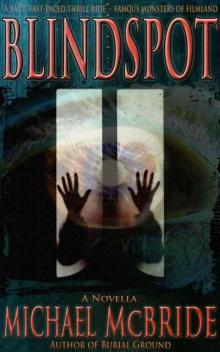 Blindspot
Blindspot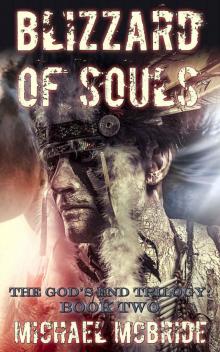 Blizzard of Souls
Blizzard of Souls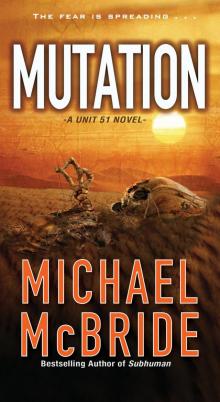 Mutation
Mutation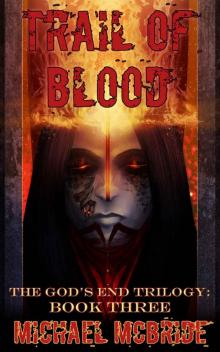 Trail of Blood
Trail of Blood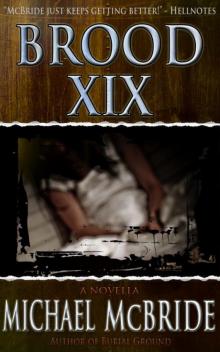 Brood XIX
Brood XIX The Fall
The Fall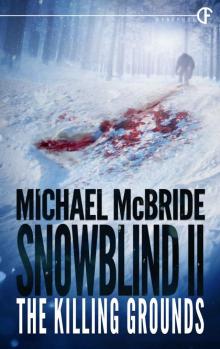 Snowblind II: The Killing Grounds
Snowblind II: The Killing Grounds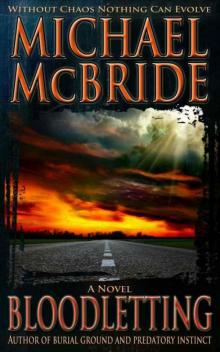 Bloodletting
Bloodletting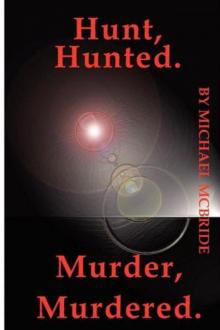 Hunt Hunted, Murder Murdered
Hunt Hunted, Murder Murdered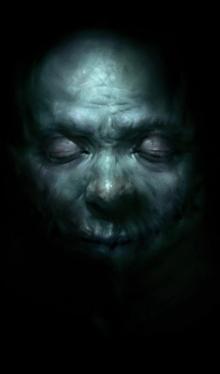 The Bloodspawn
The Bloodspawn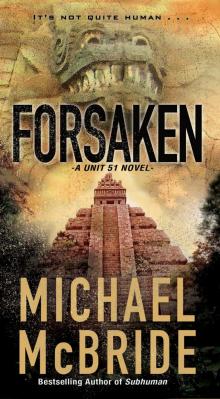 Forsaken
Forsaken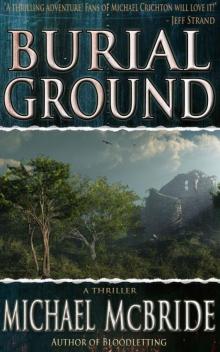 Burial Ground
Burial Ground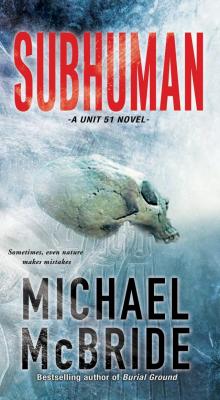 Subhuman
Subhuman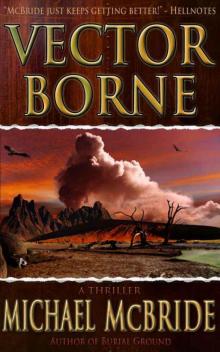 Vector Borne
Vector Borne Ancient Enemy
Ancient Enemy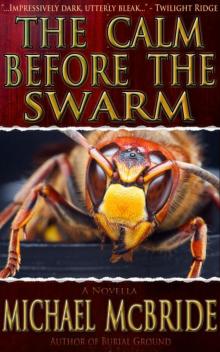 The Calm Before The Swarm
The Calm Before The Swarm Innocents Lost
Innocents Lost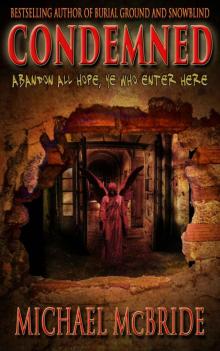 Condemned: A Thriller
Condemned: A Thriller